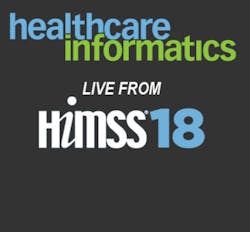HIMSS18 Day 1 Roundup: Innovation Takes Center Stage
Although the HIMSS exhibit hall doesn’t open until Tuesday, plenty of networking, meaningful sessions and impactful discussions took place on the trade show’s jam-packed “pre-conference day,” Monday, March 5. Below are some key health IT nuggets that Healthcare Informatics’ editors found especially important on day one of HIMSS.
Eric Schmidt dazzles: One of the core themes of day one was innovation and the future vision of healthcare, and there was no greater instance of this than Eric Schmidt’s keynote. Schmidt, a technical advisor and former executive chairman of Alphabet Inc. (Google’s parent company), outlined a healthcare future in which a virtual assistant would be in the physician’s office during a patient visit, listen to the provider-patient conversation, provide clinical decision support advice, document the encounter, and in the end, relieve the physician of the data entry burden that plagues so many today. “This technology—everything I just described—is buildable today or in the next few years,” Schmidt said. “All it takes is all of us, everyone in this room—to figure out how to build it. I’m going to give you a roadmap,” he added. “I’m going to start with, get to the cloud, run to the cloud. Take an airplane, fly to the cloud.”
To this end, Schmidt noted an important Google announcement that was made Monday morning; the launch of Google’s new Cloud Healthcare API, which executives said in an announcement, “addresses the significant interoperability challenges in healthcare data.” The new API, according to Google execs, “provides a robust, scalable infrastructure solution to ingest and manage key healthcare data types—including HL7, FHIR and DICOM—and lets our customers use that data for analytics and machine learning in the cloud.” Read more on the Google Cloud Healthcare API here.
Schmidt went on to say one big issue in preventing this future vision is the lack of a “killer app,” or something that causes all the data and information to become rationalized. He recalls that Windows 95 did not have internet on it at first; it was an add-on. Similarly, phones’ data wasn’t integrated in the pre-smartphone days.
Read Mark Hagland’s full write-up of the Schmidt keynote right here.
More digital IT leaders talk disruption, health tech transformation: At the CHIME-HIMSS CIO Forum, two healthcare “futurists”—Nicholas Webb, CEO of consulting firm Lassen Scientific Inc. and inventor of a wearable technology and one of the world’s smallest medical implants; and Robert Wachter, M.D., well-known in health IT circles, the chair of the department of medicine, University of California, San Francisco, and author, The Digital Doctor: Hope, Hype and Harm at the Dawn of Medicine’s Computer Age—each gave keynote discussions on the digital health landscape and what’s in store for the future. Webb focused more on consumerism and disruption, while Dr. Wachter’s presentation was more about the industry’s digital health transformation. Webb shared this tidbit with the audience on how disruption is top of mind, yet at the same time, still unknown.
CHIME recognizes HIT leaders: Also at the CIO Forum, Randy McCleese, CIO of Methodist Hospital in Henderson, Ky., officially accepted his CIO of the Year award, given out by CHIME and HIMSS jointly, and gave a small speech in which he spoke passionately about his desire to leverage health IT to improve healthcare in rural America, where McCleese has worked most of his life.
Shortly before the start of the CIO Forum, CHIME CEO Russell Branzell was honored for his work in the cybersecurity sector by the Foundation for the Malcolm Baldrige National Quality Award.
ONC’s Rucker speaks: There wasn’t much on the policy front during HIMSS17 since the transition to a Republican administration was just beginning, but that will change at this year’s show. Already, Donald Rucker, M.D., National Coordinator for Health IT, delivered a keynote at the AMDIS/HIMSS Physician Executive Symposium, in which he once again stressed the importance of improved IT usability and interoperability. Read Mark Hagland’s full piece right here.
Henry Ford Health presents on ACO success: Taking on risk in CMS’ Next Gen ACO program isn’t easy, but this Detroit health system has had real success and detailed how they worked the numbers to figure out why it was a good move. Mark Hagland with the story.
HIMSS18 by the numbers: According to figures from HIMSS’ media department, there are 1,355 exhibiting companies—the most of any HIMSS conference to date thus far. What’s more, 336 of them are first-time exhibitors and more than 100 are startups. HIMSS18 attendee numbers should be revealed in the next few days.


